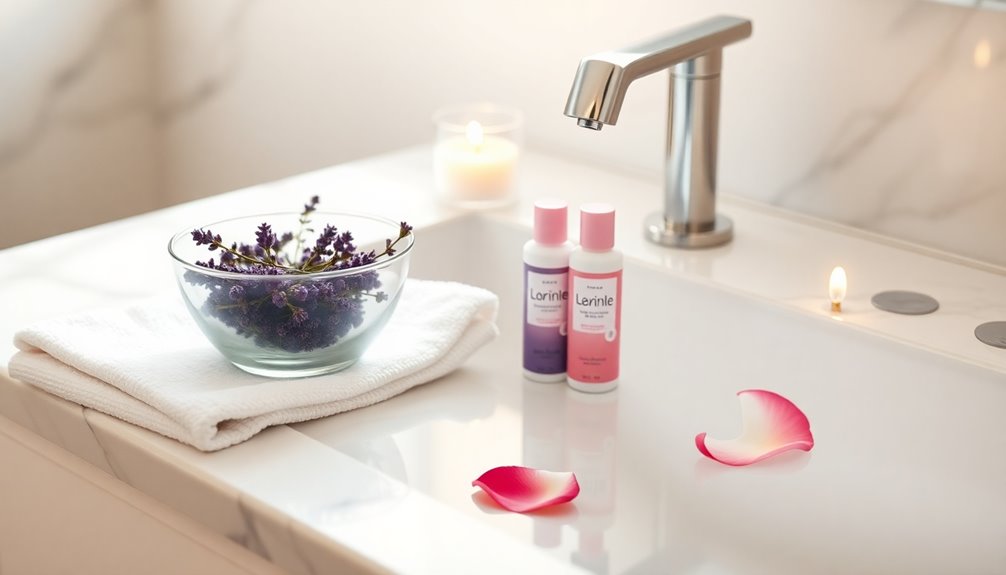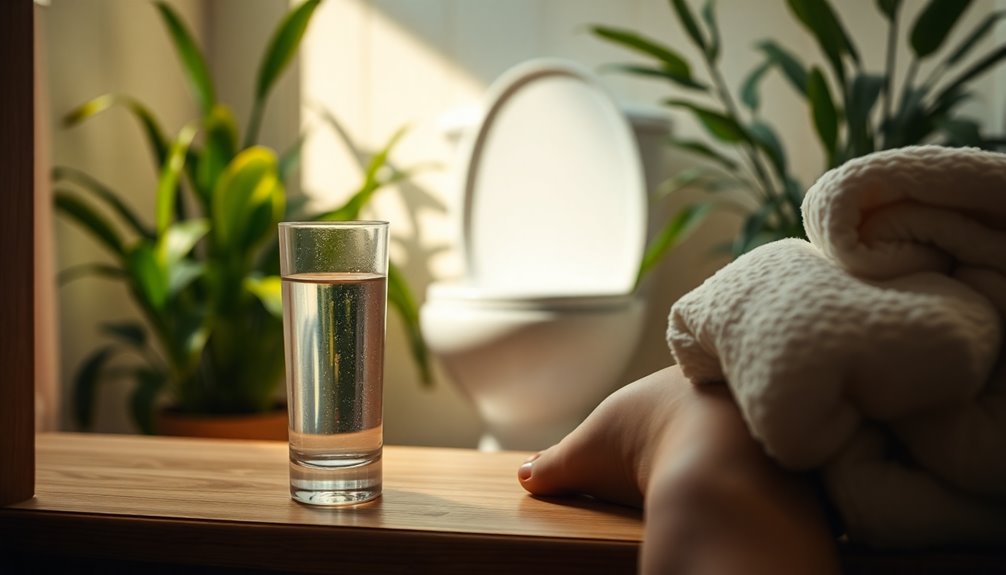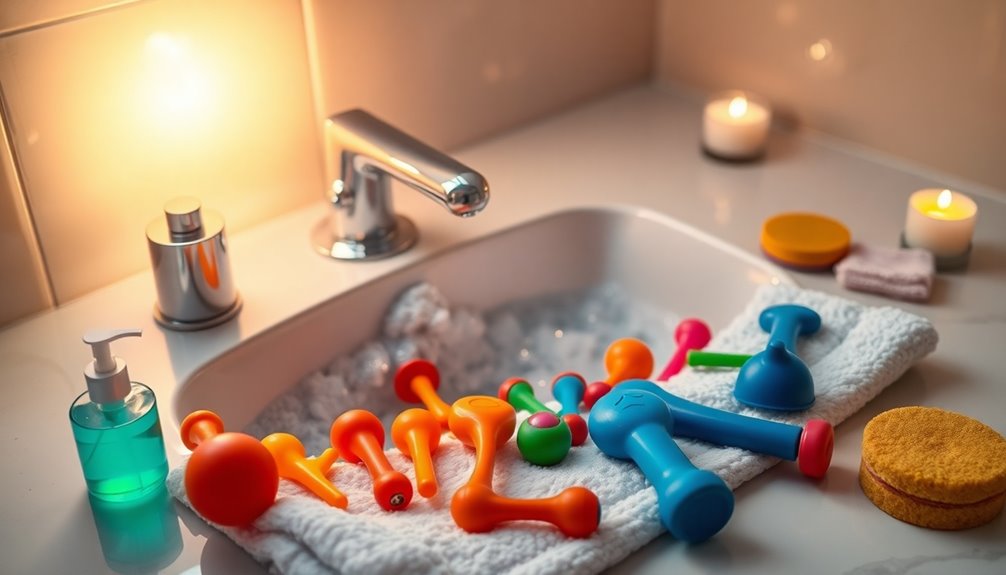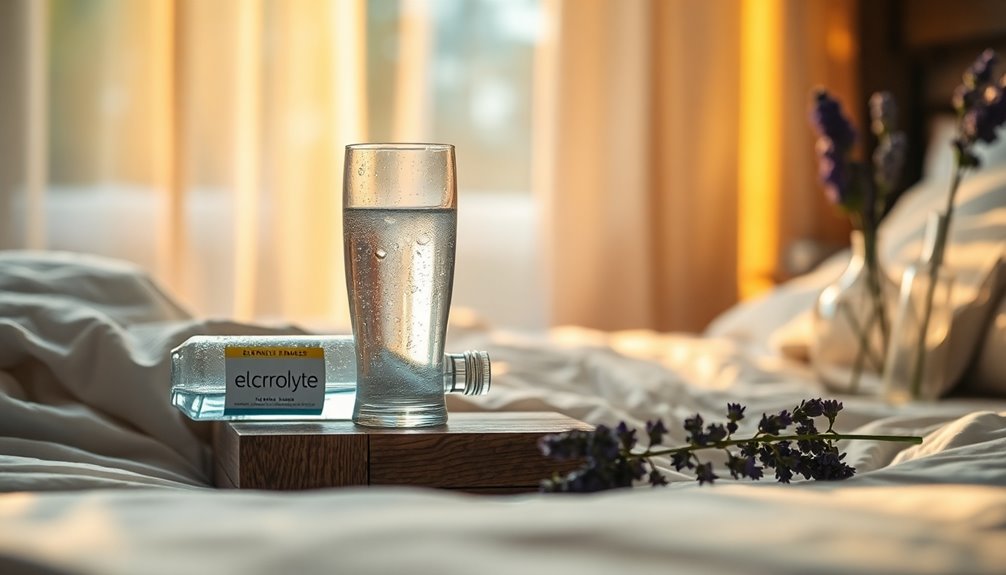After sex, prioritize hygiene by gently washing the genital area and urinating within 30 minutes to flush out bacteria and reduce the risk of UTIs. Hydrate yourself with a couple of glasses of water to help with recovery. Check in emotionally with your partner to strengthen your connection and discuss any feelings or preferences you have. Don't forget to communicate openly about sexual health and make sure to monitor any unusual symptoms or discomfort. By focusing on these aspects, you can enhance your overall experience and well-being, and there's more to discover that could be just as beneficial.
Key Takeaways
- Urinate within 30 minutes post-sex to help flush out bacteria and reduce the risk of urinary tract infections (UTIs).
- Gently wash the genital area with warm water to maintain hygiene and prevent infections.
- Stay hydrated by drinking 2-3 glasses of water after sex to aid in flushing out bacteria.
- Engage in an emotional check-in with your partner to strengthen intimacy and discuss experiences openly.
- Monitor any discomfort or unusual symptoms, and consult a healthcare provider if issues persist.
Hygiene Practices

After sex, it's vital to prioritize hygiene to keep yourself healthy. Start by gently washing your genital area with plain warm water. Your vagina self-cleans, so avoid douching or using harsh soaps that can disrupt its natural balance.
If you're a man with foreskin, pull it back and wash underneath to prevent bacterial growth. Additionally, wear breathable cotton underwear and loose-fitting clothing afterward to promote airflow and reduce moisture, which helps prevent infections.
Drinking plenty of water is important too, as it aids in flushing out bacteria, greatly lowering your risk of a urinary tract infection.
Urination After Sex

Maintaining good hygiene practices sets the stage for your next steps, including the importance of urination after sex.
Urinating after sex helps flush out bacteria from the urethra, greatly reducing the risk of urinary tract infections (UTIs). It's best to urinate within 30 minutes after sexual activity for ideal effectiveness in preventing potential infections.
Staying hydrated by drinking water post-sex can further aid in flushing out bacteria, contributing to maintaining urinary tract health.
Additionally, urination helps eliminate any residual semen, which can be beneficial if you're concerned about sperm exposure during unprotected sex.
Prioritizing urination after sex is essential for both comfort and overall genital health, ensuring you feel your best moving forward.
Emotional Check-In

After sex, it's important to share your feelings openly with your partner. Discussing what you both enjoyed and any future expectations can strengthen your bond and enhance intimacy. This honest conversation creates a supportive atmosphere where both of you feel heard and understood. Additionally, engaging in trust-building activities can further enhance your emotional connection and promote a sense of safety in your relationship.
Share Feelings Openly
While it might feel awkward at first, openly sharing your feelings after sex is essential for deepening emotional intimacy with your partner. Engaging in honest communication fosters a stronger bond, making both of you feel valued and understood.
Discussing your preferences and experiences can enhance sexual satisfaction and help prevent misunderstandings in future encounters. Regular emotional check-ins also reduce anxiety related to performance, paving the way for a healthier sexual relationship.
If you have any discomfort or concerns, addressing them immediately prevents future issues and builds trust. By creating a supportive space for these conversations, you encourage ongoing communication about feelings and sexual health, ultimately enriching your connection with each other.
Discuss Future Expectations
Engaging in an emotional check-in can naturally follow your open discussions about feelings. This step is essential for strengthening your bond and ensuring both partners align on relationship goals.
By taking the time to discuss future expectations, you create a safe space for open communication where you can share your thoughts and concerns without fear of judgment. Regular emotional check-ins not only help identify any shifts in feelings or needs but also promote adjustments as your relationship evolves.
Establishing this habit enhances intimacy, making both partners feel valued and understood. Remember, it's about fostering a connection that grows stronger with each conversation, ensuring you're both on the same page moving forward.
Safe Sex Practices

Practicing safe sex is essential for protecting your health and well-being. Always use condoms or other forms of contraception to prevent sexually transmitted infections (STIs) and unintended pregnancies.
Communicate openly with your partner about your sexual health, including STI testing history and contraceptive methods, before engaging in sexual activities. Regular STI testing is vital, as many STIs can be asymptomatic.
If you find yourself in a situation of unprotected sex, know your options for emergency contraception, such as the copper IUD or emergency contraceptive pills, which can help prevent pregnancy if taken within specific time frames.
Additionally, post-sex hygiene practices, like urinating after sex, can help reduce the risk of urinary tract infections and maintain your overall genital health.
Monitoring Symptoms
After sex, it's important to monitor any discomfort levels you may experience.
Pay attention to changes in discharge and recognize any unusual symptoms that arise.
Keeping track of these factors can help you catch potential issues early and seek medical advice when necessary.
Track Discomfort Levels
While it's common to feel some discomfort or sensitivity after sex, keeping track of your symptoms is crucial for your health. Persistent or severe pain should never be ignored.
Here's how to monitor your discomfort levels effectively:
- Journal Your Symptoms: Write down any discomfort you experience, including the severity and duration.
- Note Activities: Record any activities or positions that may contribute to your discomfort.
- Identify Unusual Symptoms: Watch for burning, itching, or any changes that seem off.
- Consult a Healthcare Provider: If discomfort lasts more than a few days or worsens, reach out to a gynecologist or urologist for evaluation.
Staying proactive about your health can help you address issues before they escalate.
Observe Discharge Changes
Monitoring discomfort levels can lead you to notice other changes in your body, particularly in vaginal discharge. After sex, keep an eye on your discharge changes.
Normal post-coital discharge is usually clear or white; however, if you suddenly see yellow, green, or a cottage cheese-like consistency, it may indicate an infection. Symptoms like persistent itching, burning, or an unusual odor warrant a visit to your healthcare provider for assessment.
Tracking these changes alongside other symptoms, such as pain during urination or intercourse, can help identify potential issues like bacterial vaginosis or yeast infections.
Regular self-checks promote proactive health management and enable early detection, ensuring you get timely medical intervention if symptoms persist.
Recognize Unusual Symptoms
Recognizing unusual symptoms after sex is essential for your overall health. Pay attention to your body and note any changes. Here are some key symptoms to monitor:
- Persistent pain, discomfort, or itching.
- Light spotting can be normal, but consistent or heavy bleeding warrants a visit to your doctor.
- Changes in vaginal discharge, especially abnormal color, odor, or consistency, may indicate an infection.
- A burning sensation during urination or after sex could signal a urinary tract infection (UTI).
If you experience any of these unusual symptoms, don't hesitate to talk to your doctor.
Regular check-ups with a gynecologist can help catch issues early, promoting better sexual and reproductive health management.
Cleaning Sex Toys

Cleaning your sex toys right after use is essential for maintaining hygiene and preventing bacterial growth.
Always follow specific cleaning instructions based on the material of your toys. For silicone toys, boiling them for 3-5 minutes or placing them on the top rack of a dishwasher effectively sanitizes them.
If you have waterproof toys, wash them with antibacterial soap and warm water, ensuring you clean all surfaces thoroughly.
For unlabeled or porous toys, use soap and hot water, paying extra attention to contact areas to eliminate any residual bacteria.
It's also important to take the time to store your cleaned toys in a clean, dry place to maintain hygiene and prevent contamination before the next use.
Clothing Choices

After sex, your clothing choices can greatly impact your comfort and health.
Opt for loose-fitting garments and breathable fabrics like cotton to promote airflow and reduce the risk of irritation.
If you're heading to bed, consider going without underwear for a cooler, dryer experience that supports genital health.
Loose-Fitting Clothing Benefits
Choosing loose-fitting clothing after sex can greatly enhance your comfort and well-being. This choice helps maintain a cool and dry environment, which is essential for preventing urinary tract infections.
Here are some benefits of opting for loose-fitting attire:
- Improved Airflow: Loose-fitting clothing allows for better airflow, reducing moisture buildup.
- Reduced Infection Risk: Breathable fabrics, like cotton, absorb moisture and keep your skin dry.
- Comfort: Skipping tight garments, like girdles or pantyhose, promotes relaxation and prevents irritation.
- Better Sleep: Wearing loose pajamas or going underwear-free can enhance your comfort while you rest.
Additionally, wearing breathable fabrics can help you reduce infection risk, as they promote a healthier environment for your skin.
Breathable Fabric Choices
Opting for breathable fabrics is key to maintaining comfort and hygiene after intimacy. Cotton underwear is an excellent choice; it's breathable, moisture-absorbing, and helps prevent bacterial and yeast growth in the genital area.
After sex, you should choose loose-fitting clothing to promote airflow and reduce irritation. Tight clothing like girdles or pantyhose can trap moisture and heat, creating a breeding ground for infections.
Consider wearing sleep shorts or even going commando at night to enhance airflow and support genital hygiene. You can also explore other breathable fabrics like bamboo or linen, which offer additional comfort and breathability. Additionally, keeping your environment clean and free from toxic plants can further contribute to overall well-being and reduce any potential irritants.
Prioritizing these fabric choices will help you feel fresh and comfortable after your intimate moments.
Nighttime Undergarment Options
When you're settling in for the night, selecting the right undergarments can make all the difference in your comfort and overall well-being. Here are some nighttime undergarment options to take into account:
- Breathable cotton underwear – It enhances comfort and reduces moisture, helping to prevent irritation and infections.
- Loose-fitting pajama pants – These promote airflow, guaranteeing a cool experience and further preventing irritation in the genital area.
- Avoid tight or synthetic materials – Materials like spandex can trap heat and moisture, increasing the risk of discomfort.
- Going commando – Allowing your genital area to stay cool and dry can greatly reduce irritation.
With these options, you can guarantee a restful and comfortable night's sleep.
Staying Hydrated

Staying hydrated after sex is essential for your overall health and comfort. Drinking 2-3 glasses of water helps flush out bacteria from your urinary tract, greatly reducing the risk of urinary tract infections (UTIs).
It's also important to maintain a daily intake of 7-8 glasses of water to keep your body hydrated. Proper hydration replenishes fluids lost during sexual activity, promoting better recovery.
Additionally, staying hydrated supports a healthy vaginal microbiome, which is crucial for maintaining moisture and balance in your body.
Consider including probiotics in your diet to further enhance hydration benefits, helping reduce the risk of infections like Bacterial Vaginosis.
Prioritizing hydration guarantees you feel your best after intimate moments.
Communication With Partner

Effective communication after sex isn't just important; it can greatly enhance your emotional connection with your partner.
By discussing your experiences openly, you create a safe space that fosters trust and intimacy.
Here are some key points to reflect upon:
- Express feelings about the experience, including any discomfort or pain.
- Share preferences to improve sexual satisfaction and understanding.
- Check in regularly about sexual health, contraceptive methods, and STI testing.
- Encourage feedback on what works and what doesn't, ensuring both partners feel valued.
Long-Term Health Considerations

Prioritizing long-term health after sex is essential for maintaining your overall well-being.
Regular STI testing is critical, especially after new partners, since many STIs can be asymptomatic and lead to serious health issues if untreated.
Communicate openly with your healthcare provider about your sexual health to tailor prevention strategies and catch issues early.
Always use condoms and other barrier methods to greatly reduce the risk of STIs and unintended pregnancies, which supports your sexual health.
Incorporating probiotics may also help maintain healthy vaginal flora, reducing the risk of infections like bacterial vaginosis that can impact reproductive health.
Finally, routine gynecological check-ups are important for monitoring your reproductive health and addressing any concerns proactively. Additionally, understanding the impact of environmental interactions on your overall health can support better long-term outcomes.
Frequently Asked Questions
What Should Girls Do After Sex?
After sex, you should prioritize your health and hygiene.
First, urinate within 30 minutes to help flush out any bacteria and reduce the risk of UTIs.
Gently clean your genital area with warm water, avoiding harsh soaps.
Opt for breathable cotton underwear to keep things cool and dry.
Staying hydrated by drinking water is essential, too.
Finally, keep an eye out for any unusual symptoms and consult a healthcare provider if needed.
What Not to Do After Sex and Why?
Imagine a garden; if you neglect it, weeds take over.
After intimacy, don't douch, as it disrupts your natural balance. Avoid scented products that irritate delicate petals.
Don't skip urination; think of it as watering your garden to keep it healthy and free of pests.
Loose clothing is your sunlight—let it breathe.
Finally, don't ignore signs of distress; even gardens need attention when something's wrong.
Nurture your well-being, and it'll flourish.
What Are the Steps to Take After Sex?
After sex, take a few simple steps to guarantee your well-being.
First, urinate within 30 minutes to flush out any bacteria and reduce UTI risk.
Then, gently cleanse your genital area with warm water, avoiding harsh soaps.
Drink 2-3 glasses of water to stay hydrated and help eliminate any pathogens.
If you used sex toys, clean them thoroughly afterward.
Finally, keep an eye out for any unusual symptoms and seek medical advice if needed.
Can I Wash After Sex to Get Pregnant?
If you're trying to get pregnant, it's best to avoid washing immediately after sex. Washing can disrupt sperm and potentially wash away those that could reach the egg.
Instead, lie down for at least 15-20 minutes to give sperm the best chance. While warm water is safe, steer clear of soaps or products that might irritate sensitive areas.
Conclusion
After all the excitement of sex, you might think it's time to kick back and relax. But remember, the real fun begins with hygiene, communication, and self-care. You wouldn't want to ignore those pesky aftercare details, right? Ironically, the moments after intimacy can reveal more about your relationship than the act itself. By taking care of yourself and checking in with your partner, you're ensuring that the connection lasts longer than just those few passionate minutes.










